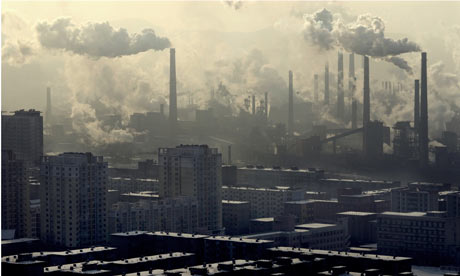China could regret setting its first carbon target. Even if the impact on the economy proves manageable, the country's negotiators have now condemned the world's most populous nation to jargon-filled number crunching and climate geekery for decades to come.
During the past six years in China, I can count the number of times I have heard locals talk about carbon offsetting on one finger. They didn't need to: under the Kyoto protocol, China and other developing nations were not obliged to do anything to reduce emissions. That will all change with yesterday's announcement, which paves the way for China to establish carbon trading, carbon taxing and, perhaps one day, carbon offsetting.
What it will not mean is an overall reduction of greenhouse gases from the world's biggest emitter. The new target is a 40-45% reduction in carbon intensity (emissions per yuan of economic activity) between 2005 and 2020. That means slowing the rate of increase rather than cutting back.
China's emissions will increase by between 90% and 108% between 2005 and 2020 if the economy grows at 8% per year, according to Arthur Kroeber of Dragonomics Research & Advisory.
But it could be a lot worse. According to the Worldwide Fund for Nature, China's new target will prevent more than 4 gigatons of carbon entering the earth's atmosphere between 2010 to 2015, in addition to the 1.5 gigatons already saved by the energy efficiency drive during the current five-year plan.
There appears to have been considerable coordination between China and the US in announcing roughly equivalent targets within a day of each other. The World Resources Institute calculates that President Obama's goal of a 17% emissions reduction is worth slightly more than a 40% improvement in carbon intensity. A like-for-like deal seems to have been reached, even though China remains publicly adamant that its actions are voluntary while those of the developed nations are mandatory.
Xie Zhenhua, the vice chairman of the National Development and Reform Commission, stressed yesterday that the goal only applies at home. It is not, he said, "internationally binding or subject to international verification". This may upset some foreign observers, but China has a better record of meeting ambitious domestic targets over the past five years than many countries have managed with internationally binding commitments.
A bigger question mark over China's announcement is the lack of ambition relative to what it has already been doing. The target is less than the country is aiming for in the current five years and less than it achieved in the previous 15 years. Xie acknowledged that China achieved energy conservation gains of 47% between 1990 and 2005. But he insisted the lower headline figure of the new target masked the fact that it is harder to achieve because all the low-hanging fruit has already been picked.
There is some truth in this – over the past five years, China has replaced thousands of small, inefficient power plants, steel factories and cement makers with more modern facilities. It has also invested heavily in renewable energy. Doing so again will be more difficult and costly.
But other countries are also pushing themselves hard despite increased costs and challenges – most notably Japan, which is already one of the world's most efficient nations but still raised its carbon reduction target 10% this year.
China's vice minister for foreign affairs, He Yafei, has said it is unreasonable to compare developed and developing nations because of the rich world's historical responsibility for carbon emissions. This is contentious. Data from the World Resources Institute puts China's cumulative emissions since 1900 at third behind the US and Russia.
However, given its 1.3 billion population, the carbon footprint of the average person in China is around a third and a quarter lower than in Europe and the US respectively. In addition, almost a fifth of the emissions that are calculated as Chinese are used to manufacture products for export to countries like the UK.
But look forward instead of back and the picture is very different. If current trends continue, China will soon be the number one climate villain in a whole new set of categories. People living in rich cities like Shanghai already have a higher average carbon footprint than people in the Japan, the UK or France. Without stronger action, this will be true of an ever increasing number of people in China.
A carbon intensity target does not mean a cut in emissions, it means a slowing of the growth in greenhouse gases relative to the expansion of the economy. This could still means very significant carbon savings. The bad news is that China's emissions are still likely to increase substantially between now and 2020.
But the jargon is clearly coming along. China is very serious about contributing in every way to the global warming debate.










